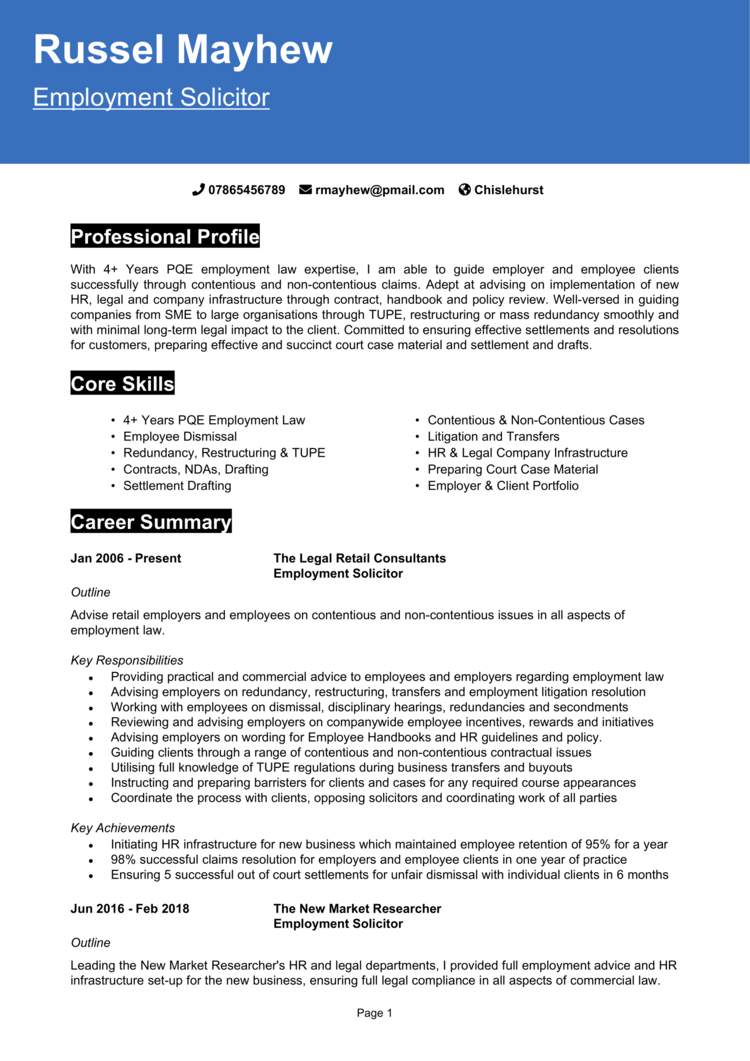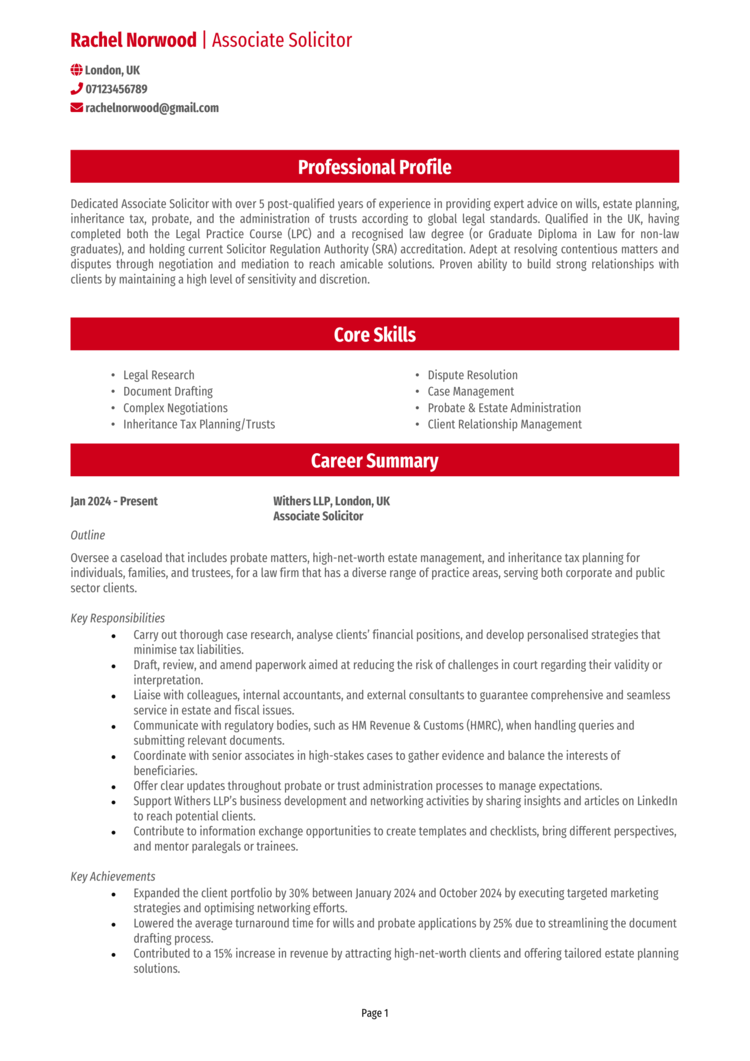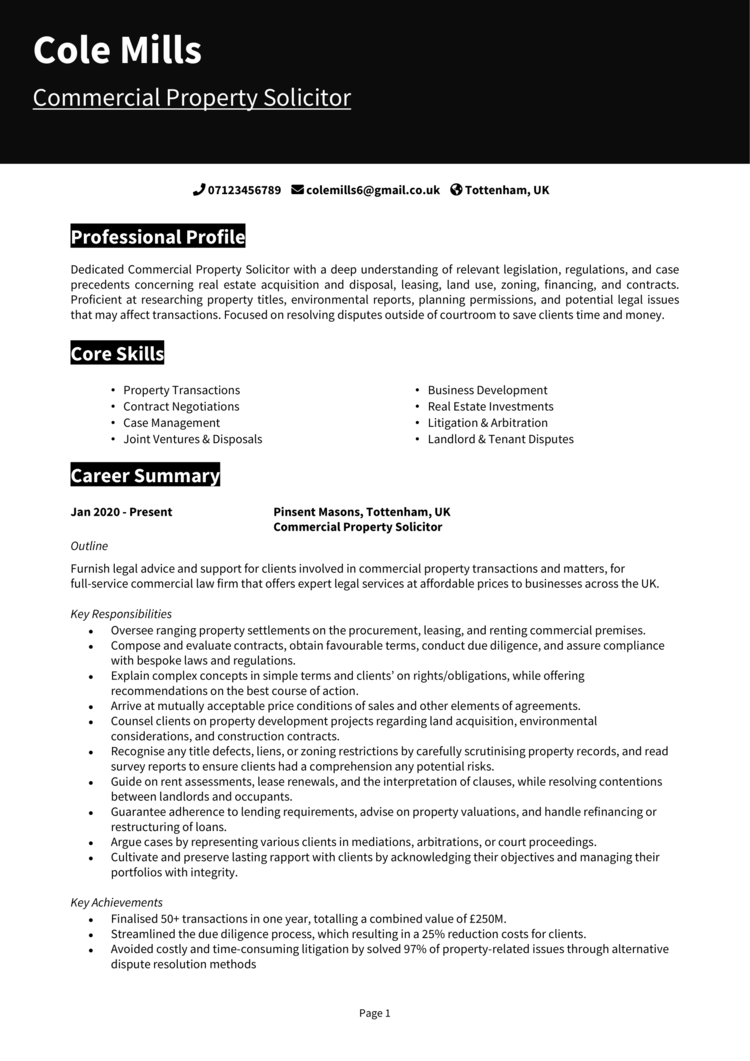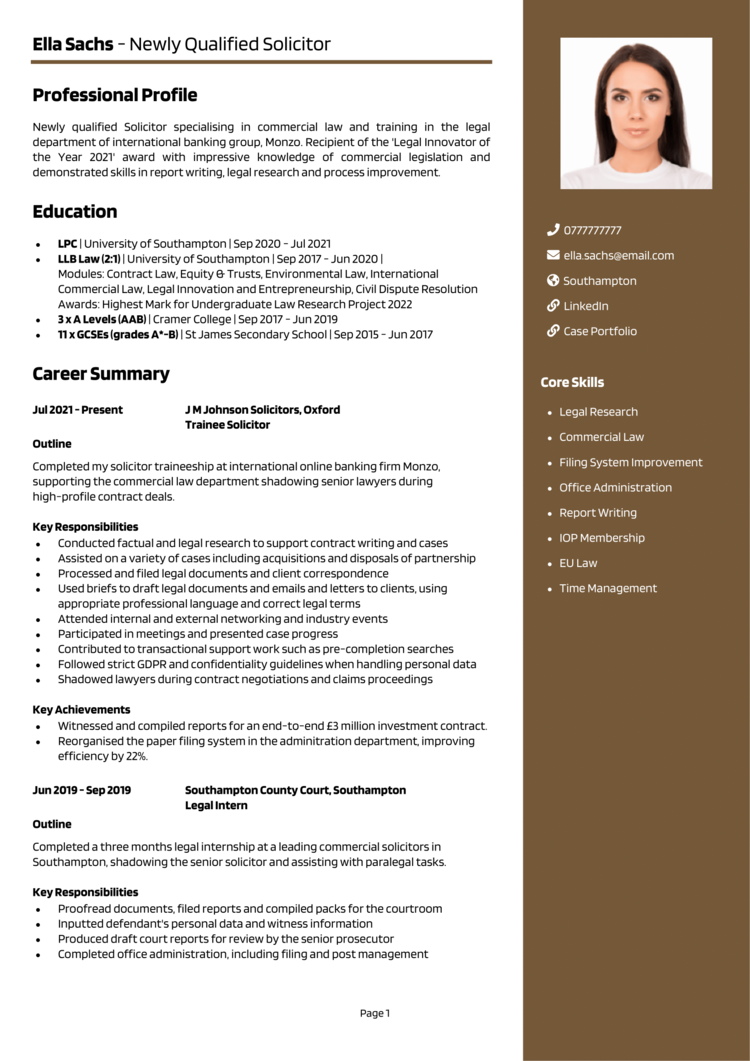Ready to put your case forward to recruiters? You’ve mastered the art of arguing your case, but now it’s time to argue why you’re the perfect hire – with your CV as Exhibit A.
These Solicitor CV examples and accompanying guide will help you structure your application and showcase your legal expertise to produce a good CV which secures interviews for top roles where you can make a real impact in the legal world.
Solicitor CV

Associate Solicitor CV

Commercial Property Solicitor CV

Family Solicitor CV

Newly Qualified Solicitor CV

How to write your Solicitor CV
Learn how to create your own interview-winning Solicitor CV with this simple step-by-step guide.
Writing a CV as a solicitor is all about demonstrating your ability to handle complex cases, manage client relationships, and navigate the intricacies of the law.
This guide will teach you how to write a CV that highlights your legal experience, technical skills, and dedication, helping you land your next big opportunity.
Solicitor CV structure


Your CV structure should be as clear and precise as a legal contract – organised, professional, and easy to follow. A strong structure ensures hiring managers can quickly spot your qualifications and expertise.
Here’s how to structure your Solicitor CV:
- Name and personal details – Place contact details at the top so hiring managers can reach you easily. You don’t need a picture of yourself: that’s optional.
- Profile – Start with a summary of your legal experience, key skills, and career highlights.
- Core skills – Focus on your core expertise, from contract negotiation to case management.
- Work experience – List your roles in reverse chronological order, focusing on your legal contributions and achievements.
- Education – Go through your academic background, legal training, and certifications, along with any awards you’ve received.
- Additional info – You could also mention hobbies and interests that reflect strategic thinking or advocacy skills.
Solicitor CV format


A messy CV format full of mistakes is like a contract with too many clauses – it’s overwhelming and likely to end up in the shredder. Keep the layout simple, sharp, and easy to navigate to ensure recruiters focus on your skills and experience.
Here’s how to format your Solicitor CV effectively:
- Bullet points – Make sure you use these to break down responsibilities and achievements for quick skimming.
- Divide sections – Use bold headings and consistent spacing to make your CV easy on the eye and easy to navigate.
- Use a clean font – Focus on readability with a professional design and font choice.
- Keep it the right length – No more than 2 pages, ensuring your highlights are front and centre while avoiding unnecessary fluff. Save any more for the cover letter.
How to create a Solicitor CV profile


Your CV profile is your opening statement – a chance to highlight your expertise and prove why you’re the best candidate for the role.
Solicitor CV profile examples
Profile 1
Experienced Solicitor with six years of expertise in commercial law, specialising in contract negotiation, mergers and acquisitions, and corporate compliance. Skilled in advising clients on complex legal matters, drafting agreements, and ensuring adherence to regulatory standards. Successfully closed deals worth over £50M for high-profile clients.
Profile 2
Dedicated Solicitor with three years of experience in family law, focusing on divorce settlements, child custody, and financial disputes. Proficient in handling sensitive cases with professionalism and empathy, achieving favourable outcomes for clients while maintaining compliance with legal protocols.
Profile 3
Proficient Solicitor with over eight years of expertise in criminal defence, representing clients in magistrates’ and Crown Courts. Skilled in case preparation, evidence analysis, and courtroom advocacy. Achieved acquittals in 85 percent of cases handled over the past two years.
What to include in your Solicitor CV profile
Here are some tips on what to include in your Solicitor CV profile:
Where you’ve worked – Mention law firms, in-house legal teams, or organisations where you’ve practiced.
- Your top qualifications – Highlight your LLB, LPC, or other relevant legal qualifications.
- Legal expertise – Quickly note your specialisation, such as corporate law, family law, or litigation.
- Client focus – Mention the types of clients you’ve advised, such as corporations, individuals, or public bodies in your CV profile.
- Notable contributions – Reference key cases or projects that showcase your impact.
Show off the core skills recruiters look for


Your core CV skills section should showcase the abilities that make you an effective solicitor. Tailor this section to the specific requirements of the role or area of law.
Most important skills for your Solicitor CV
- Legal Research – Conducting in-depth analysis of statutes, case law, and regulations to support client cases and transactions.
- Contract Drafting and Review – Preparing and scrutinising contracts to ensure clarity, compliance, and protection of client interests.
- Client Consultation – Advising clients on legal matters, rights, and potential outcomes of their cases or transactions.
- Litigation Support – Preparing case files, drafting pleadings, and managing court documentation for dispute resolution.
- Negotiation – Representing clients in negotiations to achieve favourable outcomes in contracts, settlements, or disputes.
- Regulatory Compliance – Advising businesses and individuals on adhering to relevant legal and regulatory frameworks.
- Case Management – Organising and overseeing multiple cases, ensuring deadlines and procedural requirements are met.
- Specialised Legal Expertise – Providing tailored advice in areas such as family law, corporate law, property law, or intellectual property.
- Advocacy – Representing clients in court or tribunal hearings, presenting evidence and arguments effectively.
- Legal Documentation – Drafting wills, trusts, leases, and other legal documents with accuracy and attention to detail.
How to present your work experience on your CV


Your work experience section is where you demonstrate how you’ve applied your legal skills to deliver results. Focus on your responsibilities, contributions, and outcomes in past roles.
Always list roles in reverse chronological order, with more detail for your recent and relevant ones.
How to structure jobs

- Outline – Provide a brief description of the firm or organisation, your role, and the type of law you practised.
- Responsibilities – Highlight your key tasks, such as drafting contracts, managing cases, or advising clients.
- Achievements – Include measurable outcomes, like winning cases, successful negotiations, or significant savings for clients.
Example jobs for Solicitor
Solicitor | PrimeLegal LLP
Outline
Provided legal advice and representation in commercial law matters for a mid-sized law firm specialising in corporate transactions. Focused on delivering client-focused solutions for high-stakes cases.
Responsibilities
- Drafted, reviewed, and negotiated contracts for mergers, acquisitions, and joint ventures.
- Advised clients on corporate governance and compliance with UK legal frameworks.
- Conducted due diligence to identify legal risks in business transactions.
- Represented clients in negotiations, ensuring their interests were protected.
- Prepared legal opinions and memoranda on complex regulatory issues.
Achievements
- Successfully closed a £20M acquisition deal ahead of schedule.
- Reduced client liability risks by 30 percent through comprehensive contract reviews.
- Recognised for securing favourable terms in high-value commercial disputes.
Solicitor | Harmony Family Law
Outline
Specialised in family law for a boutique legal practice, focusing on divorce settlements, child custody arrangements, and financial disputes. Provided compassionate support to clients during challenging times.
Responsibilities
- Handled a caseload of 25+ family law cases, including complex financial disputes.
- Drafted legal documents such as consent orders, parenting agreements, and divorce petitions.
- Negotiated amicable settlements to minimise court involvement and associated costs.
- Provided legal advice to clients, explaining options and guiding them through the process.
- Represented clients in family court hearings and mediation sessions.
Achievements
- Achieved a 95 percent success rate in securing favourable outcomes for custody disputes.
- Resolved 80 percent of financial disputes through mediation, reducing client costs.
- Commended by clients for professionalism and empathy in handling sensitive matters.
Solicitor | JusticeNow Legal Services
Outline
Represented clients in criminal defence cases for a legal aid firm, focusing on securing fair outcomes and upholding justice. Managed cases ranging from minor offences to serious criminal charges.
Responsibilities
- Prepared and filed legal documents, including defence statements and witness summaries.
- Advised clients on their legal rights and options during police interviews and trials.
- Liaised with barristers, experts, and law enforcement to build strong defence cases.
- Represented clients in court, presenting evidence and cross-examining witnesses.
- Maintained detailed case files, ensuring all actions were accurately documented.
Achievements
- Achieved acquittals in 85 percent of cases handled over two years.
- Reduced sentencing outcomes for 90 percent of convicted clients through effective advocacy.
- Recognised by peers for delivering thorough and persuasive defence arguments.
Education and qualifications


The education section demonstrates your academic foundation and readiness for a career in law.
Include degrees, legal training, and certifications, such as your LLB, LPC, or relevant diplomas. Highlight coursework, dissertations, or extracurricular achievements that reflect your commitment to the legal profession.
Always list qualifications in reverse chronological order, starting with the most recent.
Best qualifications for Solicitors
- Bachelor of Laws (LLB) – Provides foundational knowledge of legal systems and practices.
- Legal Practice Course (LPC) – A professional qualification required for practising solicitors.
- Master of Laws (LLM) – Demonstrates advanced knowledge in specialised areas of law.
- Diploma in Professional Legal Practice (DPLP) – Focuses on practical skills for aspiring solicitors.
- Solicitors Qualifying Examination (SQE) – A newer qualification route in England and Wales for aspiring solicitors.





